Module 5 Lao She Teahouse. language points课件(共11张PPT)
文档属性
| 名称 | Module 5 Lao She Teahouse. language points课件(共11张PPT) |
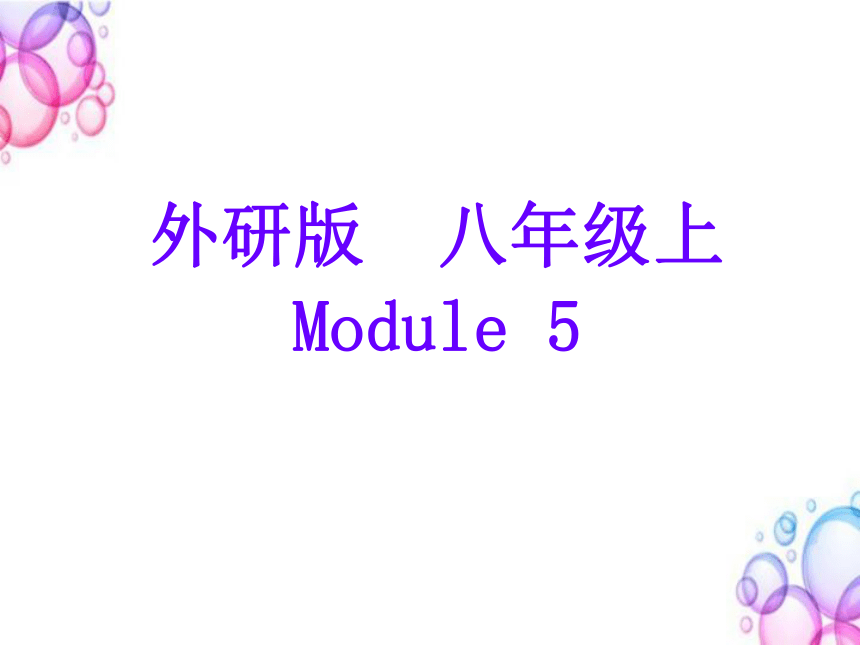
|
|
| 格式 | zip | ||
| 文件大小 | 401.5KB | ||
| 资源类型 | 教案 | ||
| 版本资源 | 外研版 | ||
| 科目 | 英语 | ||
| 更新时间 | 2020-10-26 00:00:00 | ||
图片预览

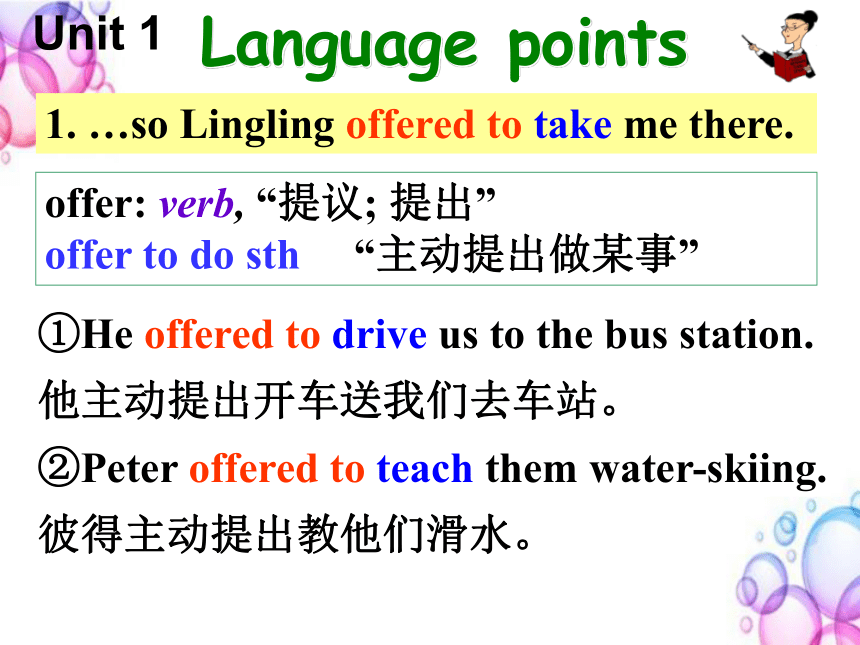
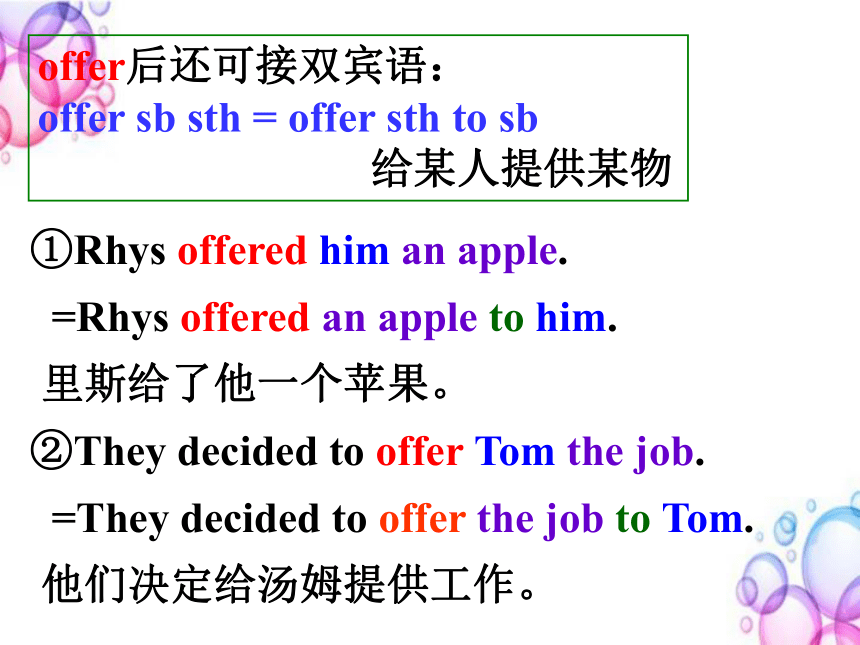
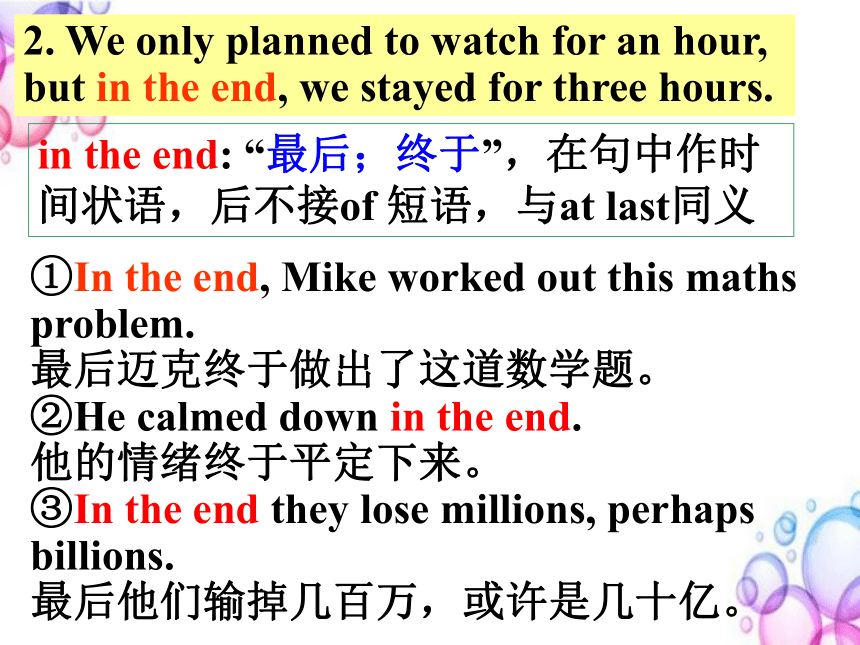
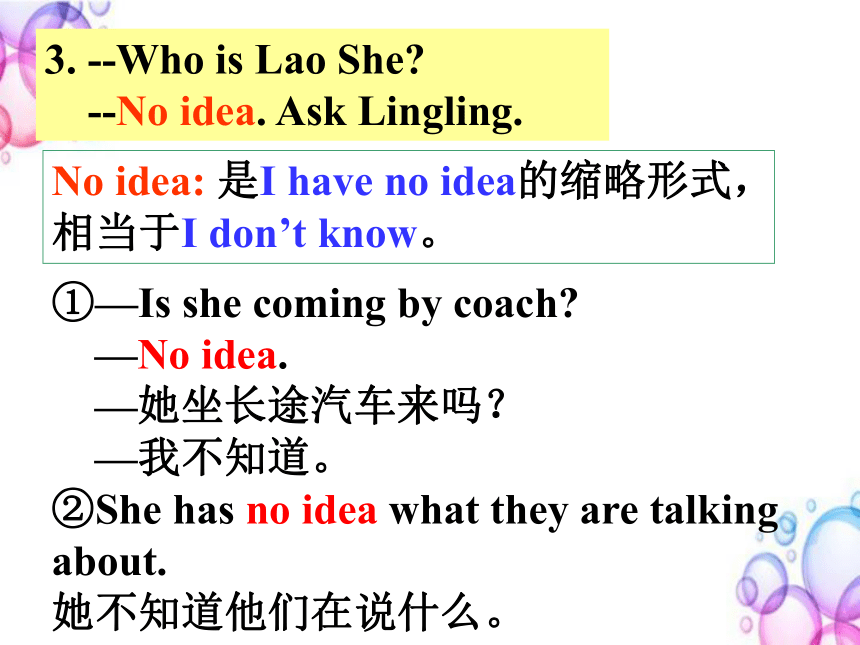
文档简介
(共11张PPT)
外研版
八年级上
Module
5
Language
points
1.
…so
Lingling
offered
to
take
me
there.
offer:
verb,
“提议;
提出”
offer
to
do
sth
“主动提出做某事”
Unit
1
①He
offered
to
drive
us
to
the
bus
station.
他主动提出开车送我们去车站。
②Peter
offered
to
teach
them
water-skiing.
彼得主动提出教他们滑水。
offer后还可接双宾语:
offer
sb
sth
=
offer
sth
to
sb
给某人提供某物
①Rhys
offered
him
an
apple.
=Rhys
offered
an
apple
to
him.
里斯给了他一个苹果。
②They
decided
to
offer
Tom
the
job.
=They
decided
to
offer
the
job
to
Tom.
他们决定给汤姆提供工作。
2.
We
only
planned
to
watch
for
an
hour,
but
in
the
end,
we
stayed
for
three
hours.
in
the
end:
“最后;终于”,在句中作时间状语,后不接of
短语,与at
last同义
①In
the
end,
Mike
worked
out
this
maths
problem.
最后迈克终于做出了这道数学题。
②He
calmed
down
in
the
end.
他的情绪终于平定下来。
③In
the
end
they
lose
millions,
perhaps
billions.
最后他们输掉几百万,或许是几十亿。
3.
--Who
is
Lao
She?
--No
idea.
Ask
Lingling.
①—Is
she
coming
by
coach?
—No
idea.
—她坐长途汽车来吗?
—我不知道。
②She
has
no
idea
what
they
are
talking
about.
她不知道他们在说什么。
No
idea:
是I
have
no
idea的缩略形式,相当于I
don’t
know。
4.
He’s
especially
famous
for
his
play
Teahouse.
①Marie
Curie
is
famous
for
her
contribution
to
science.
玛丽?居里以其对科学的贡献而享有盛名。
②He
became
internationally
famous
for
his
novels.
他以小说在国际上享有盛名。
be
famous
for
因为......而出名
be
famous
as
作为......而出名
Huang
Bo
is
more
famous
as
an
actor
than
as
a
singer.
黄渤作为演员比作为歌手名声要大。
Language
points
1.
●Teahouse
is
one
of
Lao
She’s
most
famous
plays.
●Lao
She
is
one
of
the
greatest
Chinese
writers
of
the
twentieth
century.
Unit
2
one
of
+形容词最高级(+其他修饰词)+名词复数“最……的之一”
①This
is
one
of
my
most
loved
records.
这是我最受欢迎的唱片之一。
②Physics
is
one
of
the
most
difficult
subjects.
物理是最难的学科之一。
2.
His
mother
sent
him
to
a
teacher’s
school
in
1913.
send
sb
to
some
place
“送某人去某地”
①His
father
will
send
him
to
a
different
school.
他的父亲要把他送到另一所学校。
②It's
his
parents'
choice
to
send
him
to
a
boarding
school.
把他送到寄宿学校是他父母的决定。
3.
If
you
like
the
Beijing
Opera,
traditional
music
or
magic
shows,
you
can
enjoy
them
at
the
teahouse.
主句
if引导条件状语从句
【
】
地点状语
①If
you
want
to
pass
the
exam,
you
must
study
hard.
如果你想通过考试,你必须努力学习。
②If
I
get
there
early,I
can
see
the
doctor
quickly.
如果我早早地到那里,我就可以快点看病。
若主句中有情态动词,从句用一般现在时
①If
you
see
him,
will
you
tell
him
about
it?
如果你见到他,你能告诉他那件事吗?
②If
you
invite
him,
he
will
come.
如果你请他,他会来的。
③If
it
doesn’t
rain
tomorrow,
we
will
go
to
the
park.
如果明天不下雨,我们将去公园。
当if引导的条件句用来询问或谈论十分可能的事情时,主句使用一般将来时,从句用一般现在时。
4.
Lao
She
Teahouse
gives
a
warm
welcome
to
everyone
from
all
over
the
world.
①We
gave
the
American
teacher
a
warm
welcome
at
the
party.
我们在聚会上热情地欢迎美国老师的到来。
②He
didn’t
know
why
his
friends
gave
him
a
cold
welcome.
他不知道为什么朋友们对他(的到来)反应冷淡。
give
(sb.)
a
…
welcome
(to…):
“对(某人)表示……欢迎”
外研版
八年级上
Module
5
Language
points
1.
…so
Lingling
offered
to
take
me
there.
offer:
verb,
“提议;
提出”
offer
to
do
sth
“主动提出做某事”
Unit
1
①He
offered
to
drive
us
to
the
bus
station.
他主动提出开车送我们去车站。
②Peter
offered
to
teach
them
water-skiing.
彼得主动提出教他们滑水。
offer后还可接双宾语:
offer
sb
sth
=
offer
sth
to
sb
给某人提供某物
①Rhys
offered
him
an
apple.
=Rhys
offered
an
apple
to
him.
里斯给了他一个苹果。
②They
decided
to
offer
Tom
the
job.
=They
decided
to
offer
the
job
to
Tom.
他们决定给汤姆提供工作。
2.
We
only
planned
to
watch
for
an
hour,
but
in
the
end,
we
stayed
for
three
hours.
in
the
end:
“最后;终于”,在句中作时间状语,后不接of
短语,与at
last同义
①In
the
end,
Mike
worked
out
this
maths
problem.
最后迈克终于做出了这道数学题。
②He
calmed
down
in
the
end.
他的情绪终于平定下来。
③In
the
end
they
lose
millions,
perhaps
billions.
最后他们输掉几百万,或许是几十亿。
3.
--Who
is
Lao
She?
--No
idea.
Ask
Lingling.
①—Is
she
coming
by
coach?
—No
idea.
—她坐长途汽车来吗?
—我不知道。
②She
has
no
idea
what
they
are
talking
about.
她不知道他们在说什么。
No
idea:
是I
have
no
idea的缩略形式,相当于I
don’t
know。
4.
He’s
especially
famous
for
his
play
Teahouse.
①Marie
Curie
is
famous
for
her
contribution
to
science.
玛丽?居里以其对科学的贡献而享有盛名。
②He
became
internationally
famous
for
his
novels.
他以小说在国际上享有盛名。
be
famous
for
因为......而出名
be
famous
as
作为......而出名
Huang
Bo
is
more
famous
as
an
actor
than
as
a
singer.
黄渤作为演员比作为歌手名声要大。
Language
points
1.
●Teahouse
is
one
of
Lao
She’s
most
famous
plays.
●Lao
She
is
one
of
the
greatest
Chinese
writers
of
the
twentieth
century.
Unit
2
one
of
+形容词最高级(+其他修饰词)+名词复数“最……的之一”
①This
is
one
of
my
most
loved
records.
这是我最受欢迎的唱片之一。
②Physics
is
one
of
the
most
difficult
subjects.
物理是最难的学科之一。
2.
His
mother
sent
him
to
a
teacher’s
school
in
1913.
send
sb
to
some
place
“送某人去某地”
①His
father
will
send
him
to
a
different
school.
他的父亲要把他送到另一所学校。
②It's
his
parents'
choice
to
send
him
to
a
boarding
school.
把他送到寄宿学校是他父母的决定。
3.
If
you
like
the
Beijing
Opera,
traditional
music
or
magic
shows,
you
can
enjoy
them
at
the
teahouse.
主句
if引导条件状语从句
【
】
地点状语
①If
you
want
to
pass
the
exam,
you
must
study
hard.
如果你想通过考试,你必须努力学习。
②If
I
get
there
early,I
can
see
the
doctor
quickly.
如果我早早地到那里,我就可以快点看病。
若主句中有情态动词,从句用一般现在时
①If
you
see
him,
will
you
tell
him
about
it?
如果你见到他,你能告诉他那件事吗?
②If
you
invite
him,
he
will
come.
如果你请他,他会来的。
③If
it
doesn’t
rain
tomorrow,
we
will
go
to
the
park.
如果明天不下雨,我们将去公园。
当if引导的条件句用来询问或谈论十分可能的事情时,主句使用一般将来时,从句用一般现在时。
4.
Lao
She
Teahouse
gives
a
warm
welcome
to
everyone
from
all
over
the
world.
①We
gave
the
American
teacher
a
warm
welcome
at
the
party.
我们在聚会上热情地欢迎美国老师的到来。
②He
didn’t
know
why
his
friends
gave
him
a
cold
welcome.
他不知道为什么朋友们对他(的到来)反应冷淡。
give
(sb.)
a
…
welcome
(to…):
“对(某人)表示……欢迎”
同课章节目录
- Module 1 How to learn English
- Unit 1 Let's try to speak English as much as possi
- Unit 2 You should smile at her.
- Unit 3 Language in use .
- Module 2 My home town and my country
- Unit 1 It's taller than many other buildings.
- Unit 2 Cambridge is a beautiful city in the east o
- Unit 3 Language in use .
- Module 3 Sports.
- Unit 1 Nothing is more exciting than playing tenni
- Unit 2 This year we training more carefully.
- Unit 3 Language in use .
- Module 4 Planes, ships and trains .
- Unit 1 He lives the farthest from school.
- Unit 2 What is the best way to travel.
- Unit 3 Language in use .
- Module 5 Lao She Teahouse.
- Unit 1 I wanted to see the Beijing Opera.
- Unit 2 It descibes the changes in Chinese society.
- Unit 3 Language in use .
- Module 6 Animals in danger.
- Unit 1 It allows people to get closer to them .
- Unit 2 The WWF is working hard to save them all.
- Unit 3 Language in use .
- Revision module A
- Module 7 A famous story
- Unit 1 Alice was sitting with her sister by the ri
- Unit 2 She was thinking about her cat.
- Unit 3 Language in use .
- Module 8 Accidents
- Unit 1 While the car were changing to red, a car s
- Unit 2 I was trying to pick it up when it bite me
- Unit 3 Language in use .
- Module 9 Population
- Unit 1 The population of China is about 1.37 billi
- Unit 2 Arnwick was a city with 200,000 people.
- Unit 3 Language in use .
- Module 10 The weathe
- Unit 1 It might snow.
- Unit 2 The weather is fine all year round.
- Unit 3 Language in use .
- Module 11 Way of life
- Unit 1 In China ,we open a gift later.
- Unit 2 In England, you usually drink tea with milk
- Unit 3 Language in use .
- Module 12 Help
- Unit 1 What should we do before help arrives?
- Unit 2 Stay away from windows and heavy furniture.
- Unit 3 Language in use .
- Revision module B
